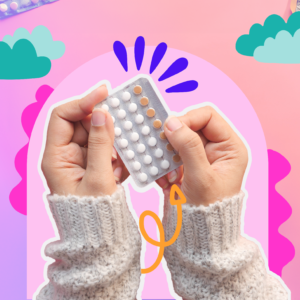At Sync N, we believe in empowering women to make informed decisions about their health. Understanding the hormonal effects of different birth control methods is crucial for choosing what’s best for your body and fitness goals. Let’s explore the various birth control options and how they impact your body.

Combination Birth Control Pills
- Hormones: Contain estrogen and progestin.
- Effects: Prevent ovulation, thicken cervical mucus, and thin the uterine lining. These pills can regulate menstrual cycles, reduce cramps, and improve acne, making them a popular choice for non-contraceptive reasons.
- How You Feel: Many women experience fewer PMS symptoms, lighter periods, and improved skin. However, some may face side effects like nausea, breast tenderness, weight gain, and mood changes.
Progestin-Only Pills (Minipills)
- Hormones: Contain only progestin.
- Effects: These pills thicken cervical mucus and thin the uterine lining, with ovulation still occurring in some women.
- How You Feel: Minipills are less likely to cause estrogen-related side effects but may lead to irregular bleeding or spotting.
Intrauterine Devices (IUDs)
- Hormones: Available in hormonal (levonorgestrel) and non-hormonal (copper) options.
- Effects: Hormonal IUDs release progestin locally, preventing sperm from reaching the egg, while copper IUDs create a toxic environment for sperm.
- How You Feel: Hormonal IUDs can reduce menstrual flow and cramps, while copper IUDs may initially increase bleeding and cramps. Some women might experience hormonal side effects like mood swings.
Implants
- Hormones: Contain progestin.
- Effects: The implant is inserted under the skin of the upper arm, releasing progestin to prevent ovulation, thicken cervical mucus, and thin the uterine lining.
- How You Feel: Implants can cause irregular bleeding, but many women experience lighter periods or no periods at all. Side effects may include headaches, breast tenderness, and mood changes.
Injectable Birth Control (Depo-Provera)
- Hormones: Contains progestin.
- Effects: Given as an injection every three months, it prevents ovulation, thickens cervical mucus, and thins the uterine lining.
- How You Feel: Some women may experience weight gain, headaches, and mood changes. Periods often become lighter or stop, but irregular bleeding can occur.
Birth Control Patch and Vaginal Ring
- Hormones: Contain estrogen and progestin.
- Effects: The patch is applied to the skin, and the ring is inserted into the vagina. Both release hormones to prevent ovulation, thicken cervical mucus, and thin the uterine lining.
- How You Feel: Similar to combination pills, they can regulate menstrual cycles and reduce PMS symptoms. Side effects might include skin irritation (patch) or vaginal irritation (ring).
Understanding the hormonal impacts of birth control options is crucial for choosing the best method for your body, lifestyle, and health goals. By staying informed, you can make decisions that align with your body’s unique needs.
Ready to take back control of your health? Download Sync N and discover personalized fitness and nutrition plans tailored to your cycle. Click to download the app! iOS | Android


